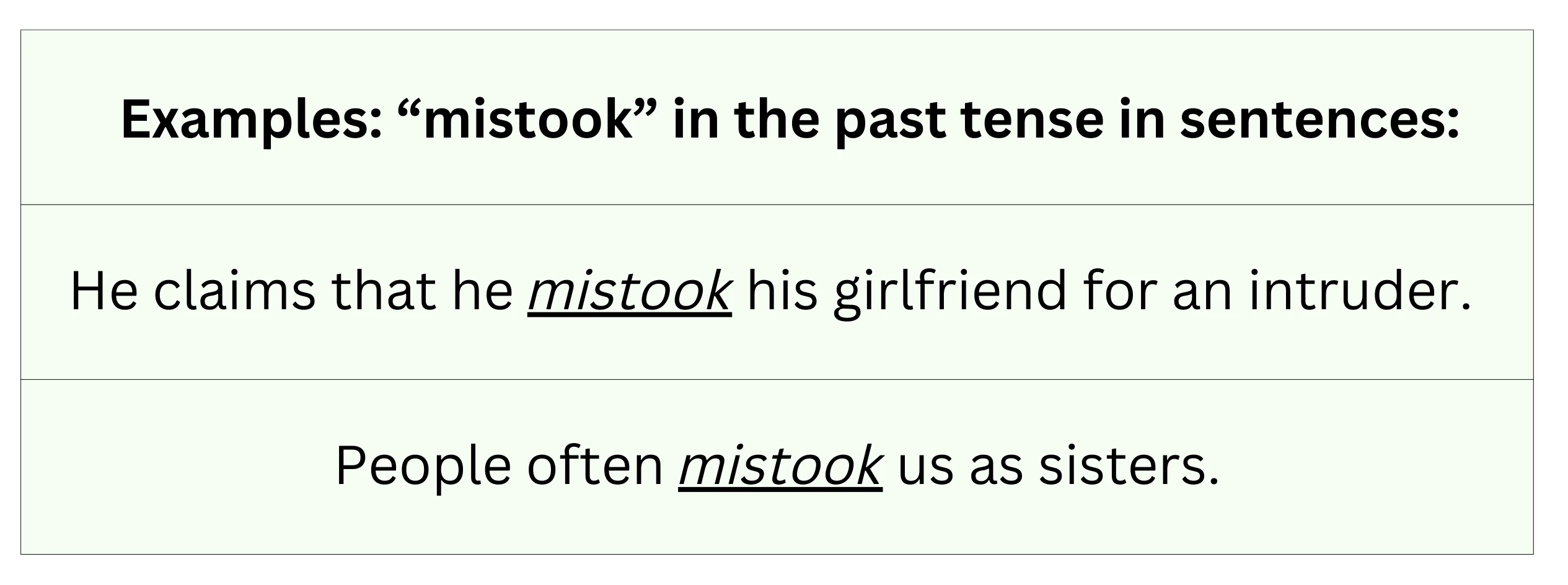
Is it mistook or mistaken?
The irregular verb, mistake, (present tense) is both a noun and a verb, which makes things a bit trickier to understand in terms of verb conjugations. Still—make no mistake—knowledge is power, and we will explore the correct way to conjugate the verb forms of ‘mistake’ below.
She mistook his silence for disapproval.
I have never mistaken her for anyone else.
She mistaken his silence for disapproval.
I have never mistook her for anyone else.
To start with a definition, the noun mistake means “an action, decision or judgment that produces an unwanted or unintentional result: I’m not blaming you, we all make mistakes” (Cambridge dictionary).
The verb form of mistake means something slightly different, since it refers to an action or state of being: “to be wrong about or to fail to recognize something or someone: You can’t mistake their house – it has a bright red front door“.
What are the tenses of mistake?
To mistake is the present tense: The teacher points out the mistake in my essay.
Mistakes is third-person present singular: He makes these mistakes all the time.
Mistaking is the present participle: She is mistaking my friend for her twin sister because they look so similar.
Mistook is the simple past: She mistook his kindness for romantic interest.
Will mistake is the future tense: I will not make the same mistake again; I’ve learned my lesson.
Mistaken is the past participle: She seems to have mistaken your intentions and believes you meant to offend her.
Which is correct: mistook or mistaken?
The answer is that both mistook and mistaken are correct past forms of the present tense verb, mistake. The contexts in which to use either past form, and their correct use, does slightly differ from each other. See the sentences below:
Past tense: I mistook my friend for someone else and called out the wrong name.
Past participle: The police officer realized he had mistaken the suspect for someone else.
The participle form, mistaken, combines with the auxiliary verb had to form the past perfect tense. The past perfect tense (also called pluperfect) helps relay when some event in the past happened before something else, or some other past event. The simple past tense, which here uses mistook, is simpler: it refers to an event that began and ended at a point in the past.
Examples of mistake in the present tense (in sentences)
I mistake her for my sister sometimes.
He often makes the same mistake in his math homework.
The teacher points out the mistake in my essay.
Making mistakes is a natural part of the learning process.
Please double-check your work to avoid any mistakes in the final report.
Examples of mistook in the past tense (in sentences)
I mistook the time of the meeting and arrived an hour late.
She mistook his kindness for romantic interest.
She mistook my intentions and got upset.
I mistook my friend for someone else and called out the wrong name.
They mistook my intentions and thought I was trying to cause trouble.
The pattern: mistake/mistook/mistaken follows take/took/taken.
Examples of the past participle mistaken (in sentences)
They realized they had mistaken the address and went back to the right location.
I have mistaken her for her twin sister on several occasions.
He had mistaken the meeting time and arrived an hour late.
The police officer realized he had mistaken the suspect for someone else.
She seems to have mistaken your intentions and believes you meant to offend her.
Synonyms of mistake
All of these words can convey a similar meaning to “mistake“, though there may be subtle differences in meaning. Make sure to choose the appropriate word for the specific context in which it’s used!
- blunder
- lapse
- miscalculation
- misstep
- aberration
- fault
- gaffe
- inaccuracy
- error
- oversight
- slip
- snafu (a badly confused or ridiculously muddled situation, Dictionary.com)
Origin of mistake
From etymology online on mistake (v.):
Mid-14c., “to commit an offense;” late 14c., “to misunderstand, misinterpret, take in a wrong sense,” from mis- (1) “badly, wrongly” + take (v.) or from a cognate Scandinavian source such as Old Norse mistaka “take in error, miscarry.”
Other commonly confused verb tenses
- What’s the past tense of spread?
- What’s the past tense of lead?
- What’s the past tense of choose?
- What’s the past tense of fly?
- What’s the past tense of lay?
- What’s the past tense of drive?
- What’s the past tense of draw?
Learn more about verbs
Work Sheet
What is the simple past tense form of the verb “mistake”?
Which form of “mistake” is used as a past participle, often with auxiliary verbs like ‘have’ or ‘had’?
According to the post, which sentence structure is incorrect?
Which of the following sentences correctly uses the simple past tense of “mistake”?
Which form is used when “mistake” acts as a present participle?
She ________ his kindness for romantic interest.
I have never ________ her for anyone else.
The police officer realized he had ________ the suspect for someone else.
Yesterday, I ________ my friend for someone else and called out the wrong name.
She seems to have ________ your intentions and believes you meant to offend her.
Frequently Asked Questions
What is the simple past of mistake?
+
What is the past participle?
+
Are mistook and mistaken correct past forms?
+
When is mistook used correctly?
+
When is mistaken used correctly?
+
Yash, D. "What’s the Past Tense of Mistake? Is it Mistook or Mistaken?." Grammarflex, Jun 12, 2025, https://www.grammarflex.com/is-it-mistook-or-mistaken-whats-the-past-tense-of-mistake/.
Sources
-
Harper, Douglas. “Etymology of mistake.” Online Etymology Dictionary, https://www.etymonline.com/word/mistake. Accessed 28 July, 2023.











